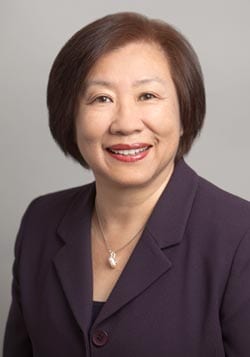
Suzanne Lee shocked Boston’s political establishment last year by nearly snatching a district City Council seat away from incumbent Bill Linehan.
Pundits were stunned that Lee, from her base in Chinatown, drew enough votes from Linehan’s South Boston home turf to come within less than 100 votes of defeating him in the general election. She had actually beaten him in the three-way preliminary.
But anyone who knows her life story would not be as surprised. Lee has been skillfully navigating across cultures since arriving in Boston from Hong Kong as an 11-year-old.
Her first home in America was on Blue Hill Avenue in Grove Hall, at a time when Roxbury was undergoing a demographic transition from mostly Jewish to mostly black. She went to college at Brandeis University.
Her first year of teaching in the city coincided with the start of busing for desegregation, which transferred Chinese students from the Chinatown school where she worked to Charlestown. She later served as principal of that same school, Josiah Quincy Elementary, when it had a diverse enrollment in the last decade.
Lee cofounded the Chinese Progressive Association, which soothed tensions between black and Chinese residents of the Castle Square complex in the South End. The Chinatown-based organization helped organize a tenants’ council that drew residents into cross-racial cooperation.
As the post-busing racial tensions eased and the city emerged a majority population of color, many members of younger generations have grown up comfortable relating to people from diverse racial-ethnic backgrounds.
Lee has been doing it a much longer time.
“I grew up on Blue Hill Ave,” Lee recalled. “We were one of three Chinese families. It was half Jewish and half black, a transition time. So I kind of grew up with a mix. I didn’t have any Chinese friends because they weren’t around the neighborhood.”
When she enrolled in William Lloyd Garrison Elementary on Hutchings Street, Lee spoke no English — bilingual education was not yet Boston Public School Department policy. An immigrant girl who had been at the top of her class in Hong Kong became one of three Chinese students at Garrison.
“My father took me to school the first day,” she said. “The principal said to him, ‘We’re going to have to put her back a few years because she doesn’t know anything.’ What does that mean? That means I don’t know English, therefore, I don’t know anything.”
Lee learned a second language and then went to the Girls’ Latin. In her graduating class of 190, there were 14 Chinese students.
“That’s a substantial number in those days,” Lee noted. Brandeis on a scholarship came next.
In 1974, she started teaching in Boston, at the Quincy School.
“A lot of my friends growing up, we found each other teaching at Boston Public Schools,” Lee said.
The next year, busing started for elementary students. Alarm spread among limited English-speaking garment workers in Chinatown when they received official letters about their children’s transfers to Charlestown. Some of the mothers did not even know where Charlestown was.
To reassure the anxious parents, that fall Lee began accompanying students from the South End and Chinatown on the school buses to Charlestown.
The Chinese parents discovered that the balanced racial-ethnic parent councils established under the federal court order placed them in the demeaning category of “others.” The School Department would rebuff the parents’ entreaties by telling them that the desegregation case brought by the NAACP was a matter of black and white.
In 1977, Lee was a cofounder of the Chinese Progressive Association. The advocacy organization based in Chinatown played a role in easing interracial misunderstandings and tensions in the nearby Castle Square after Chinese started moving into the predominately black complex in the 1980s.
The association helped form the Castle Square Tenants Organization in 1987. It brought the mix of tenants together to resist rent increases and the complex’s conversion to market-rate condos, for instance.
“When it comes down to important things, people will come together. Common interest,” Lee said. “But somebody has to help them come together.”
As an educator, Lee worked her way up to being a principal, first turning around Baldwin School in Brighton and then leading Quincy School for a decade before retiring in 2009. She won praise for the excellent academics at the Quincy, where she arranged for students to participate in enrichment learning activities. White parents have largely abandoned the Boston schools, but some prosperous ones chose Quincy over a private school.
The decades of bridge-building and community organizing paid dividends when Lee challenged Linehan for the District 2 seat on the council. The occupant of that seat, like Linehan, has always been a South Boston resident. Lee lives in Chinatown.
“I knocked on doors, and I know every single street in South Boston. I made some terrific friends,” Lee recalled. “People were surprised that I was there knocking on their doors, but they still did talk.”
Then enough of them voted for her that she almost pulled off a rarity — defeating a council district incumbent.






